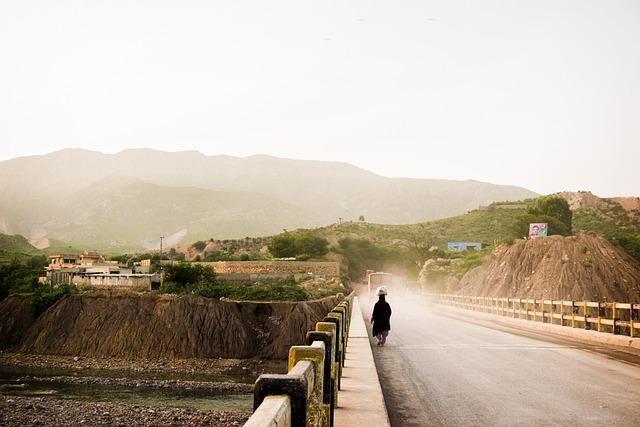In the heart of South Asia, where the majestic peaks of the Himalayas meet the vibrant tapestry of culture and history, Pakistan stands at a complex crossroads. For decades, this nation has fought an arduous battle against homegrown extremism—a challenge deeply rooted in political, social, and economic factors. The landscape of violence and ideology has transformed the very fabric of Pakistani society, prompting a multifaceted response from the state and its citizens. As the country navigates through the turbulent waters of its past and strives for a more peaceful future, it becomes imperative to delve deeper into the intricacies of this conflict. This article aims to illuminate the forces at play in Pakistan’s fight against extremism, exploring the ideological battleground and the efforts being made to reclaim a narrative that asserts peace and inclusivity, while reflecting on the profound implications for stability and unity in the region.
Understanding the Roots of Homegrown Extremism in Pakistan
The emergence of homegrown extremism in Pakistan can be traced back to a complex interplay of historical, cultural, and socio-economic factors. Socio-political instability in the region has fueled discontent, making youth susceptible to radical ideologies. The intertwining of religious extremism with national identity has also played a significant role, where militant groups exploit deeply ingrained beliefs to rally support. Furthermore, the rise of education inequality and lack of opportunities has driven many towards these ideologies as a means of expressing frustration and seeking purpose.
Additionally, it’s essential to comprehend the influence exerted by foreign interventions and internal conflicts that have further exacerbated the problem. The proliferation of extremist narratives, often amplified by certain media outlets, has shaped public perception and conceptualization of violence as a legitimate means for achieving political or religious goals. Addressing these root causes requires a multifaceted approach that encompasses:
- Community Engagement: Promoting dialogue among diverse groups to foster understanding.
- Education Reform: Ensuring access to quality education to reduce vulnerability.
- Economic Opportunities: Creating jobs and skill development programs for youth.
- Counter-narratives: Actively debunking extremist ideologies through targeted messaging.

Evaluating Current Strategies: What Works and What Needs Reform
As Pakistan continues to grapple with the complexities of homegrown extremism, a rigorous evaluation of existing strategies is essential. The current approaches have yielded mixed results, revealing both effective tactics and areas in dire need of reform. Among the successful measures are:
- Community Engagement: Programs that foster collaboration between law enforcement and local communities have proven instrumental in reducing mistrust and improving information flow.
- Education Initiatives: Incorporating anti-extremism narratives into school curricula helps combat radical ideologies at a young age.
However, several strategies must be reformed to enhance effectiveness. Key aspects demanding attention include:
- Judicial Reforms: Strengthening the legal framework to ensure timely and fair trials of those accused of extremism can enhance public confidence in the system.
- Counter-Narrative Campaigns: Efforts to challenge extremist ideologies via social media are lagging; enhancing these campaigns can play a crucial role in discrediting extremist rhetoric.
| Strategy | Status | Recommendations |
|---|---|---|
| Community Engagement | Effective | Expand to rural areas |
| Education Initiatives | Partially Effective | Include teacher training |
| Judicial Reforms | Ineffective | Implement specialized courts |
| Counter-Narrative Campaigns | Lagging | Increase digital outreach |

Building Bridges: The Role of Education in Countering Extremism
Education emerges as a powerful tool in the struggle against homegrown extremism in Pakistan. By fostering a curriculum that emphasizes critical thinking, inclusivity, and social cohesion, educational institutions can rebut extremist narratives that prey on vulnerable populations. Comprehensive programs can:
- Encourage dialogue: Schools and universities can host forums that promote open discussions about societal issues, allowing students to express their views and consider opposing perspectives.
- Enhance social responsibility: Community service initiatives can help instill a sense of duty towards one’s neighbors and society at large.
- Promote cultural appreciation: By incorporating diverse histories and cultures into the curriculum, students may develop a broader understanding of the world.
Moreover, collaboration between government, non-governmental organizations, and educational institutions can create robust programs aimed at deradicalization. Engaging students early and effectively is key, as studies indicate that positive educational experiences correlate with a decreased likelihood of radicalization. Initiatives may include:
| Initiative | Description |
|---|---|
| Peace Education | Courses designed to teach conflict resolution and empathy. |
| Mentorship Programs | Pairing youth with positive role models from diverse backgrounds. |
| Extracurricular Activities | Clubs and sports that promote teamwork and inclusion. |

Community Resilience: Empowering Local Voices Against Radicalization
The journey towards a more resilient community in Pakistan is one anchored in the belief that local voices are crucial to combatting the roots of radicalization. Grassroots initiatives are vital in shifting narratives and creating counter-narratives that resonate within local cultures. By engaging citizens in dialogue and providing platforms for expression, communities can effectively challenge extremist ideologies. Empowerment through education and outreach programs encourages individuals to become agents of change, fostering an environment where tolerance and understanding flourish. Key strategies include:
- Community Workshops: Facilitating discussions to raise awareness about the dangers of extremism.
- Youth Engagement: Directing efforts towards young people who are vulnerable to radical influences.
- Partnerships with Local Leaders: Collaborating with influential figures to amplify positive messages.
Monitoring and evaluation are essential in affirming the effectiveness of these initiatives. Supporting local organizations with resources and training allows for continuous improvement and adaptation of strategies based on community needs. Collaborative efforts between government entities, NGOs, and residents pave the way for a unified front against radicalization. A table outlining key initiatives and their impact is presented below:
| Initiative | Target Group | Impact |
|---|---|---|
| Dialogue Creation | Community Leaders | Strengthened community bonds |
| Education Programs | Youth | Increased critical thinking |
| Art and Culture Events | General Public | Promotion of diversity |
To Conclude
As we draw the curtain on our exploration of Pakistan’s battle against homegrown extremism, it becomes clear that the path forward is fraught with challenges, yet illuminated by resilience. The intricate web of socio-political dynamics, cultural narratives, and security concerns underscores the complexity of this issue. While the scars of the past are deep, the steadfast determination of the Pakistani people and their leadership highlights a collective resolve to reclaim their narrative and foster a more stable future.
Navigating this multifaceted terrain requires not only policy reform and security measures but also a concerted effort to engage communities, promote education, and instill a sense of inclusivity. As Pakistan continues to confront its internal struggles, the lessons learned and the stories shared will be crucial in building a formidable bulwark against the tide of extremism.
the battle against homegrown extremism is not merely a fight for security, but a testament to the strength of a nation striving to redefine its identity amidst adversities. The journey may be long, but it is one laden with hope—a hope that the echoes of peace will eventually drown out the reverberations of discord. As we conclude, we are left with the question: What future will Pakistan forge in its ongoing quest for stability and harmony? The answer lies in the hands of its people.



